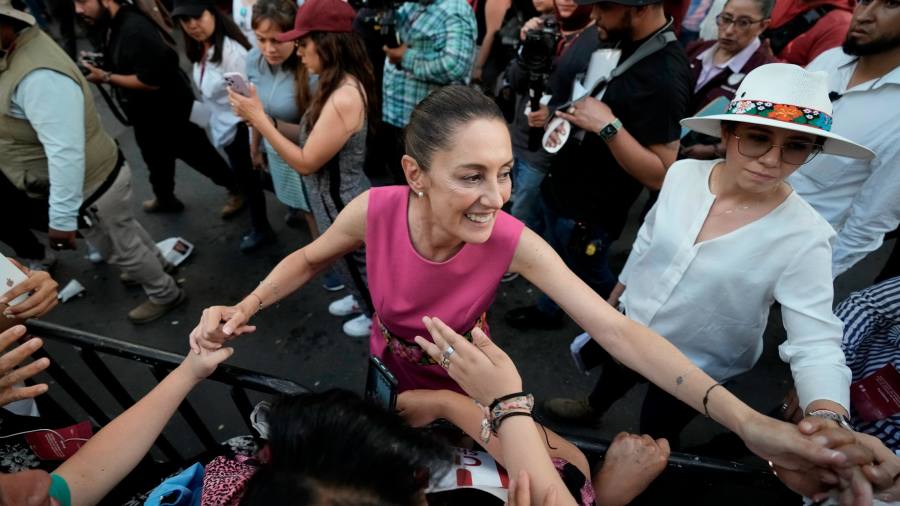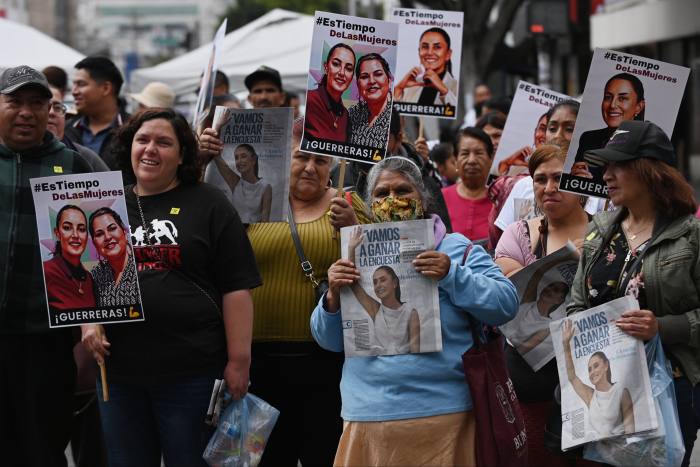
In a small, tropical city in southern Mexico, a politician from the capital whipped up a crowd by promising them something unusual: more of the same.
Claudia Sheinbaum met with a warm reception at the rally last month in Macuspana, the home municipality of President Andrés Manuel López Obrador, but she is also walking a difficult line.
The climate scientist has tied her political fortunes to Mexico’s leftwing president as she contests the ruling Morena party nomination — but her technocratic background contrasts sharply with his populist style. And later in the race, if the opposition provides strong competition, Sheinbaum may need to prove she can tread her own path.
At the rally, speakers blasted propaganda banda music proclaiming “don’t doubt that Claudia will always be with Andrés Manuel”, as she stood onstage with the president’s brother. Hundreds of people wearing hats in the party’s red-pink colour listened and cheered; buses brought in supporters to boost the moderately sized crowd.
Sheinbaum joined López Obrador’s Mexico City cabinet as environment minister in 2000. Her loyalty to the president, who is limited to a single term under Mexico’s constitution, is a boon with his Morena base. But if the presidential race is fiercely fought, that loyalty may prevent her from winning over more sceptical voters.
“She’s in a difficult position because everything she does to try to grow could cost her with the electorate she has,” said Carlos Bravo Regidor, a professor at Mexico’s Centro de Investigación y Docencia Económicas (CIDE).

While López Obrador is known to be a natural political communicator who gives hours-long press conferences, dishing out quips that later enter the lexicon, detractors say Sheinbaum is a stiff campaigner. “She isn’t spontaneous. She isn’t authentic. She isn’t charismatic,” said Bravo.
But her supporters maintain she is a serious, data-driven decision maker who cares about social justice.
Sheinbaum, 61, was the Mexican capital’s first Jewish mayor, with two grandparents who fled Bulgaria to escape the Holocaust. She is also a respected climate scientist who worked on the UN’s Intergovernmental Panel on Climate Change.
If she won the presidency, she would be Mexico’s first female leader.
“It’s not what would you do differently, but what would you strengthen in the next phase,” she told the Financial Times after the rally. “I would accelerate the energy transition to renewables . . . I would put a lot of emphasis on other environmental issues that haven’t been touched in this period like decontaminating rivers and bodies of water . . . women’s rights, a lot more investment in science and technology.”
Mexico’s renewable energy sector has seen new investment plummet since nationalist López Obrador upended it by favouring state companies that produce dirtier energy.
Sheinbaum said she would keep López Obrador’s promise of 54 per cent of electricity generation being under state control, with the rest private with “clear rules”, emphasising that there was “room for everyone”.
Oscar Ocampo, the Coordinator for Energy at the Mexican Institute for Competitiveness, said the next government would face pressured public finances and a strained electricity grid, making more private investment necessary.
“Beyond party colours, there is only one reality and the next government will have to adapt to that,” he said. “The challenge is political, not economic. The appetite to invest is there . . . they will have to find a political narrative to make it viable.”

Global investors believe Mexico, a middle-income country of almost 130mn people, has a huge, temporary opportunity to capture investment from companies relocating production out of China and closer to the US as they see greater supply chain risks surrounding the Asian country.
Overall foreign direct investment edged up to $35bn last year, ranking Mexico 11th globally, and electric-car maker Tesla pledged to build a much-hyped new factory there. But economists say the president’s decisions are hurting the country’s ability to capitalise on the trend.
Sheinbaum said she was open to talking with investors about their concerns, but was also critical of Mexico’s original free trade agreement with the US and Canada, signed in the early 1990s and updated in 2020.
“Though it had its virtues, it was based on cheap labour that generated a lot of problems in Mexico. This new process of industrialisation has to be accompanied by wellbeing,” she said, referring to adequate housing, water and public services at new sites. “Where are the workers that work at Tesla going to live?”
Sheinbaum has a 10-point lead for the Morena nomination over her nearest rival, former foreign minister Marcelo Ebrard, according to a poll by Parametria, which also shows Morena’s alliance far ahead of the opposition.
López Obrador enjoys approval ratings of about 60 per cent, and voters in the president’s home state of Tabasco, where a new $17bn oil refinery and part of a $20bn mega tourist train are under way, are clear that they want the current projects and social programmes to continue.
“Compared to all the other governments we’ve had [this one has] been excellent,” said Cornelio Leyva, a 36-year-old oil industry worker. “Whoever the person is, as long as they are with Morena they will follow the line set by the president.”
However, even López Obrador’s supporters have complaints about security.
Homicides are falling from their 2018-2020 peak, but the president’s term is already the deadliest ever for Mexico. In recent weeks different groups have kidnapped public officials in two states, burnt down a market with workers inside, and blown up a police car with a landmine.
Sheinbaum, who was praised for her security strategy in Mexico City, said that at the federal level there should be more co-ordination between the National Guard state police, prosecutors and the judiciary, and a focus on sound investigations.
“If you don’t have a scheme that allows you to build a justice system, you won’t have quick results,” she said. “Technology per se is not the solution. It’s an instrument, a mechanism for intelligence, investigation and justice.”
In Macuspana, Claudia Bastar, a 59-year-old retired teacher at Sheinbaum’s rally, said she was excited about the prospect of a female president, but was clear that her choice was based on the president’s trust.
“We’re loyal to el pejejito,” she said, referring to López Obrador’s nickname after a local species of fish. “If Claudia is with Morena, our absolute vote is for Claudia.”